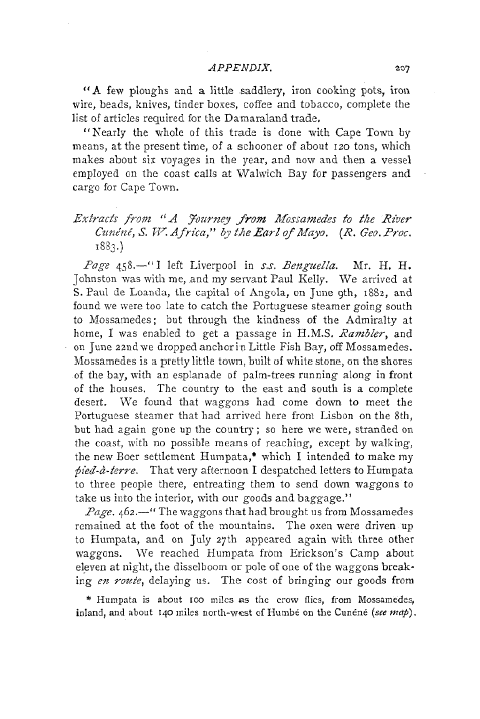APPENDIX. 207
"A few ploughs and a little saddlery, iron cooking pots, iron wire, beads, knives, tinder boxes, coffee and tobacco, complete the list of articles required for the Damaraland trade,
"Nearly the whole of this trade is done with Cape Town by means, at the present time, of a schooner of about 120 tons, which makes about six voyages in the year, and now and then a vessel employed on the coast calls at Walwich Bay for passengers and cargo for Cape Town.
Extracts from "A ,journey from Mossamedes to the River Cunini, S. W Africa," by the Earl of Mayo. (R. Geo. Proc. 1883.)
Page 458.-" I left Liverpool in s,s. Benguella. Mr. H. H. Johnston was with me, .and my servant Paul Kelly. We arrived at S. Paul de Loanda, the capital of Angola, on June 9th, 1882, and found we were too late to catch the Portuguese steamer going south to Mossamedes ; but through the kindness of the Admiralty at home, I was enabled to get a passage in H.M.S. Rambler, and on June 22ndwe dropped anchorin Little Fish Bay, off Mossamedes. Mossamedes is a pretty little town, built of white stone, on the shores of the bay, with an esplanade of palm-trees running along in front of the houses. The country to the east and south is a complete desert. We found that waggons had come down to meet the Portuguese steamer that had arrived here from Lisbon on the 8th, but had again gone up the country; so here we were, stranded on the coast, with no possible means of reaching, except by walking, the new Boer settlement Humpata,* which I intended to make my pied-d-teere. That very afternoon I despatched letters to Humpata to three people there, entreating them to send down waggons to take us into the interior, with our goods and baggage."
Page. 4.62.-" The waggons that had brought us from Mossamedes remained at the foot of the mountains. The oxen were driven up to Flumpata, and on July 27th appeared again with three other waggons. We reached Humpata from Erickson's Camp about eleven at night, the disselboom or pole of one of the waggons breaking en route, delaying us. The cost of bringing our goods from
* Humpata is about too miles as the crow flies, from Mossamedes, inland, and about too miles north-west of Humbd on the Cunene (see map),

